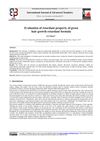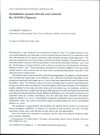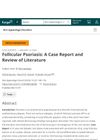
The new gel for hair loss is safe, effective, and reduces side effects.
 March 2021 in “Actas Dermo-Sifiliográficas”
March 2021 in “Actas Dermo-Sifiliográficas” The microbiome may be linked to hair loss and could be a target for new treatments.
[object Object]  May 2019 in “International journal of advanced chemistry”
May 2019 in “International journal of advanced chemistry” The green cream safely slowed hair growth by 25%.
 June 2015 in “Biomedical and biopharmaceutical research”
June 2015 in “Biomedical and biopharmaceutical research” The congress showed advancements in skin hydration, barrier function, and safe, effective new cosmetic formulations.
 September 2011 in “Journal der Deutschen Dermatologischen Gesellschaft”
September 2011 in “Journal der Deutschen Dermatologischen Gesellschaft” Effective treatments for scalp psoriasis include glucocorticosteroids, Vitamin D3 analogs, and combination therapies like calcipotriol and betamethasone dipropionate.

The document concludes that most hair loss treatments don't work, balding isn't caused by dandruff, and hair loss may indicate serious health issues that require medical attention.
 November 2020 in “Postepy Dermatologii I Alergologii”
November 2020 in “Postepy Dermatologii I Alergologii” Sulfotransferase SULT1A1 activity may predict minoxidil treatment success for hair loss.
 43 citations,
July 1984 in “Clinical and Experimental Dermatology”
43 citations,
July 1984 in “Clinical and Experimental Dermatology” Antiandrogen therapy helped increase hair growth in women with hormonal imbalances related to baldness.
 42 citations,
April 2012 in “Seminars in Oncology”
42 citations,
April 2012 in “Seminars in Oncology” Targeted cancer therapies often cause skin problems that need careful management to improve patient quality of life and treatment success.
 24 citations,
July 1983 in “Clinical and Experimental Dermatology”
24 citations,
July 1983 in “Clinical and Experimental Dermatology” Tigason improved hair growth in a boy with monilethrix without side effects.
 17 citations,
October 2013 in “F1000Research”
17 citations,
October 2013 in “F1000Research” A 2-year-old boy grew excessive hair after using minoxidil for hair loss, but it improved when the treatment stopped.
28 citations,
January 1999 in “Dermatology” Fluconazole is the preferred treatment for deep skin infections in immunocompromised patients.
 January 2024 in “Skin appendage disorders”
January 2024 in “Skin appendage disorders” A man with follicular psoriasis got better after treatment with skin cream and allergy pills.
22 citations,
January 2020 in “Veterinary dermatology” The conclusion is that certain dog and cat breeds are prone to Malassezia dermatitis, which can be diagnosed with skin tests and treated with antifungal shampoos or medications, and preventing relapses involves managing underlying issues and maintaining good hygiene.
59 citations,
January 2003 in “Phytomedicine” Fennel extract cream can reduce hair thickness in people with excessive hair growth.
 43 citations,
March 2019 in “JAMA Dermatology”
43 citations,
March 2019 in “JAMA Dermatology” Hair regrowth treatments had modest benefits for patients with long-term hair loss after chemotherapy.

PRP injections did not significantly improve hair growth in men with androgenetic alopecia.
 April 2024 in “Asian Journal of Medical Sciences”
April 2024 in “Asian Journal of Medical Sciences” Ring block anesthesia is best for comfort and acceptance in PRP hair loss treatments.
 June 2023 in “Drugs & Therapy Perspectives”
June 2023 in “Drugs & Therapy Perspectives” New treatments for male pattern hair loss look promising, but established treatments are still the main option.
 January 2023 in “Indian Dermatology Online Journal”
January 2023 in “Indian Dermatology Online Journal” Bimatoprost and clobetasol are both effective for scalp hair loss, but bimatoprost works faster, has fewer side effects, and grows more colored hair.
 January 2020 in “Social Science Research Network”
January 2020 in “Social Science Research Network” Skin bacteria help in skin regeneration and wound healing, with a specific signal called IL-1β playing a crucial role.
A new method allows for controlled, long-lasting delivery of retinoic acid through the skin with less inflammation.
December 2021 in “International Journal of Research in Dermatology” Early diagnosis and personalized treatment are crucial for managing hair loss in India.
 48 citations,
May 2013 in “Canadian Medical Association Journal”
48 citations,
May 2013 in “Canadian Medical Association Journal” Primary cicatricial alopecia, a rare disorder causing permanent hair loss, is hard to diagnose and treat, with treatments like anti-inflammatory drugs and steroids offering varied results and no guaranteed cure. Psychological support for patients is important, and future research should aim to identify causes of the condition.
[object Object] 33 citations,
June 2021 in “Dermatologic Therapy” COVID-19 vaccines can trigger autoimmune flares but are still beneficial for patients with autoimmune conditions.
33 citations,
January 2018 in “Blood” Ruxolitinib helps protect skin stem cells and keeps skin healthy in mice with skin GVHD.
 32 citations,
January 2022 in “International Journal of Molecular Sciences”
32 citations,
January 2022 in “International Journal of Molecular Sciences” Melatonin, a hormone, can help protect skin from aging by reducing stress, inflammation, and damage, and may also help treat hair loss in women.
 26 citations,
July 2019 in “Dermatology and Therapy”
26 citations,
July 2019 in “Dermatology and Therapy” The conclusion is that genetic testing is important for diagnosing and treating various genetic hair disorders.
 13 citations,
May 2021 in “Plants”
13 citations,
May 2021 in “Plants” The leaf extract of Leea indica may reduce inflammation, dissolve blood clots, and promote hair growth.
 13 citations,
September 2019 in “Clinical, Cosmetic and Investigational Dermatology”
13 citations,
September 2019 in “Clinical, Cosmetic and Investigational Dermatology” Early treatment of EPDS can improve outcomes and reduce recurrence risk.























